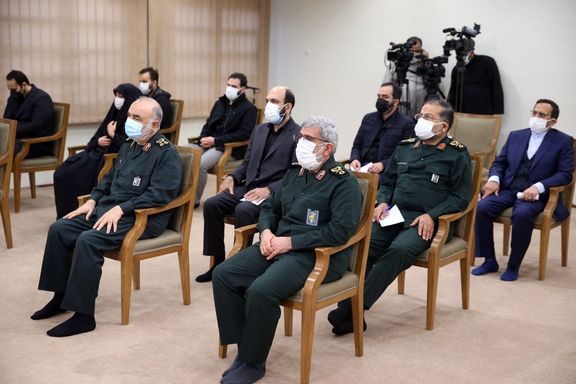Iran Analysts Doubt Tehran Will Make Deal To Limit IRGC Activities

Iranian analysts abroad say it is unlikely Tehran would limit activities of the Revolutionary Guard just to have its terror designation lifted by Washington.

Iranian analysts abroad say it is unlikely Tehran would limit activities of the Revolutionary Guard just to have its terror designation lifted by Washington.
Observers in Iran and abroad have been saying during the past weeks that the issue of the IRGC's designation as a foreign terrorist organization (FTO) is the main hinderance to a renewed nuclear agreement between Tehran and Washington.
Mehdi Mahdavi Azad in Germany and Houshang Hassanyari, a military analyst in Canada, expressed skepticism to Iran International TV on Saturday about Iran's willingness to seriously limit the role of IRGC and its Qods Force.
When on Friday reporters asked White House Press Secretary Jen Psaki how far the Biden administration is ready to go in its attempt to salvage the remains of the Obama-era nuclear deal with Iran, she evaded the question.
Psaki said negotiations were still ongoing and had nothing more to offer. Meanwhile, she refused to address their concern about whether secret negotiations with Iran "are turning into negotiations with terrorists."
Mahdavi termed the secret negotiations between Iran and the United States over the IRGC issue, "JCPOA-2". He pointed out that in fact this was the term Supreme Leader Ali Khamenei had used in a March 2016 speech. According to Mahdavi, Khamenei defined JCPOA-2 as a model the United States and other Western states had suggested for reducing tensions in the region. "Khamenei said at the time that if he accepted the idea, the Westerners would then ask for the disbanding of the IRGC Qods Force," Mahdavi said.
The analysts maintained that whatever the world knows as Iran's revolutionary foreign policy fully involves the IRGC and its Qods Force. If Tehran is negotiating with Washington over IRGC’s role, it simply wants to make sure that the terrorist designation is lifted.
Asked if this could change the Islamic Republic's foreign policy, Hassanyari said: "This would be the biggest retreat for the Islamic Republic and its leader Khamenei. The IRGC's role in the region has been one of the most important problems US officials are focused on." Hassanyari agreed with Mahdavi that it is the IRGC carries out the Tehran's regional policy.
Mahdavi said the reason the Islamic Republic has not admitted that talks are taking place about the role of the IRGC, is because people in Iran will ask why Khamenei had not done this during the past ten years and allowed a large part of the population to go into poverty. Naturally, if Khamenei has to negotiate with America, it has to be done secretly. Mahdavi added that the Iranian regime might have to undermine its credibility before its own supporters and give bigger concessions to the West if it feels that it is the only way out of problems it faces.
Hassanyari said that the fate of Iran's proxy groups in the region are also part of the negotiations. This will further humiliate the Islamic Republic both at home and in those countries where it has heavily invested to build influence.
In another part of the interview, Mahdavi said that the Obama administration ignored the demands of regional countries including Israel when it forged the 2015 agreement with Iran. However, the Biden administration is paying more attention to the growing concerns in Israel and Arab countries about a compromise with Tehran particularly as Iran has been launching attacks on some Arab countries and intervening in the affairs of other Arab states.